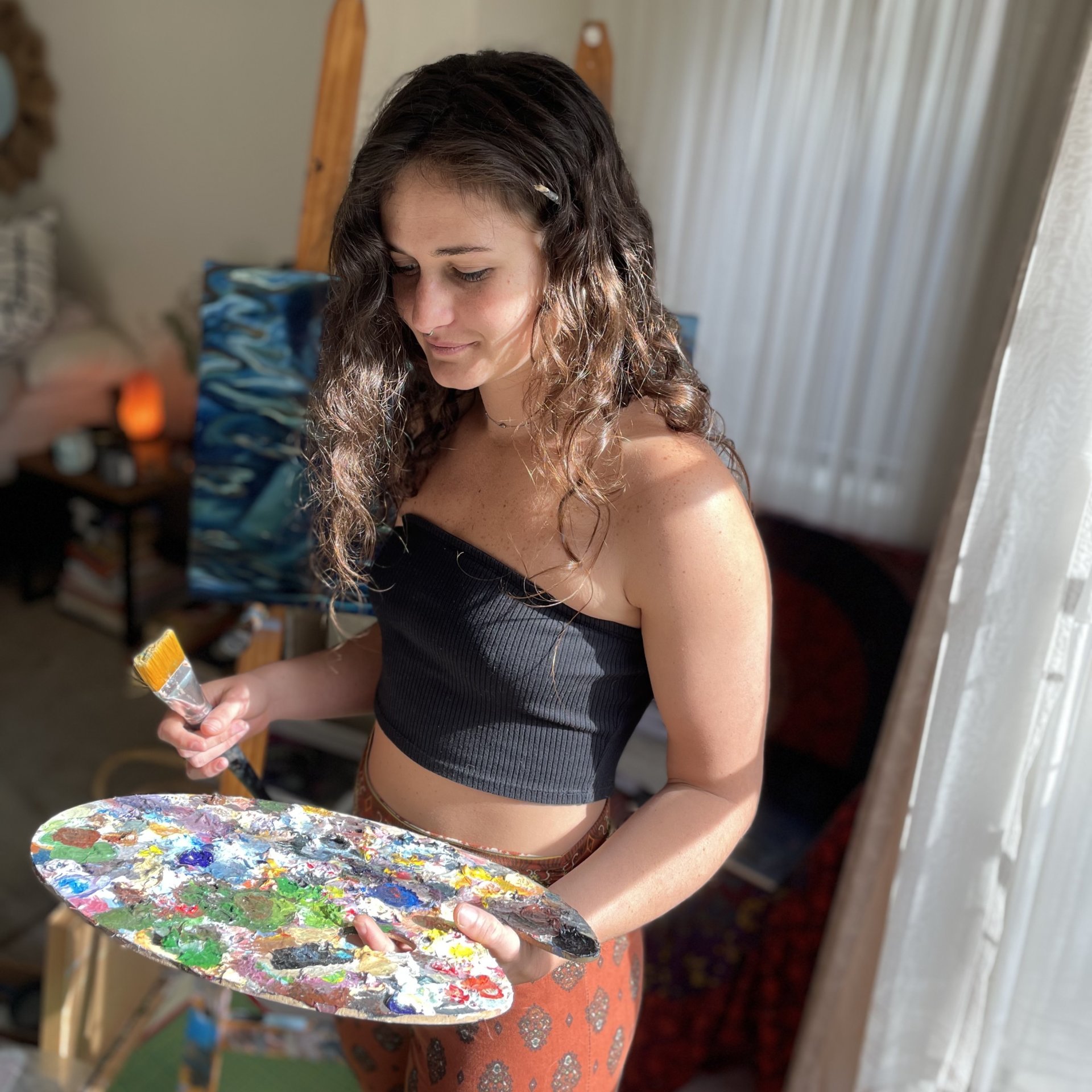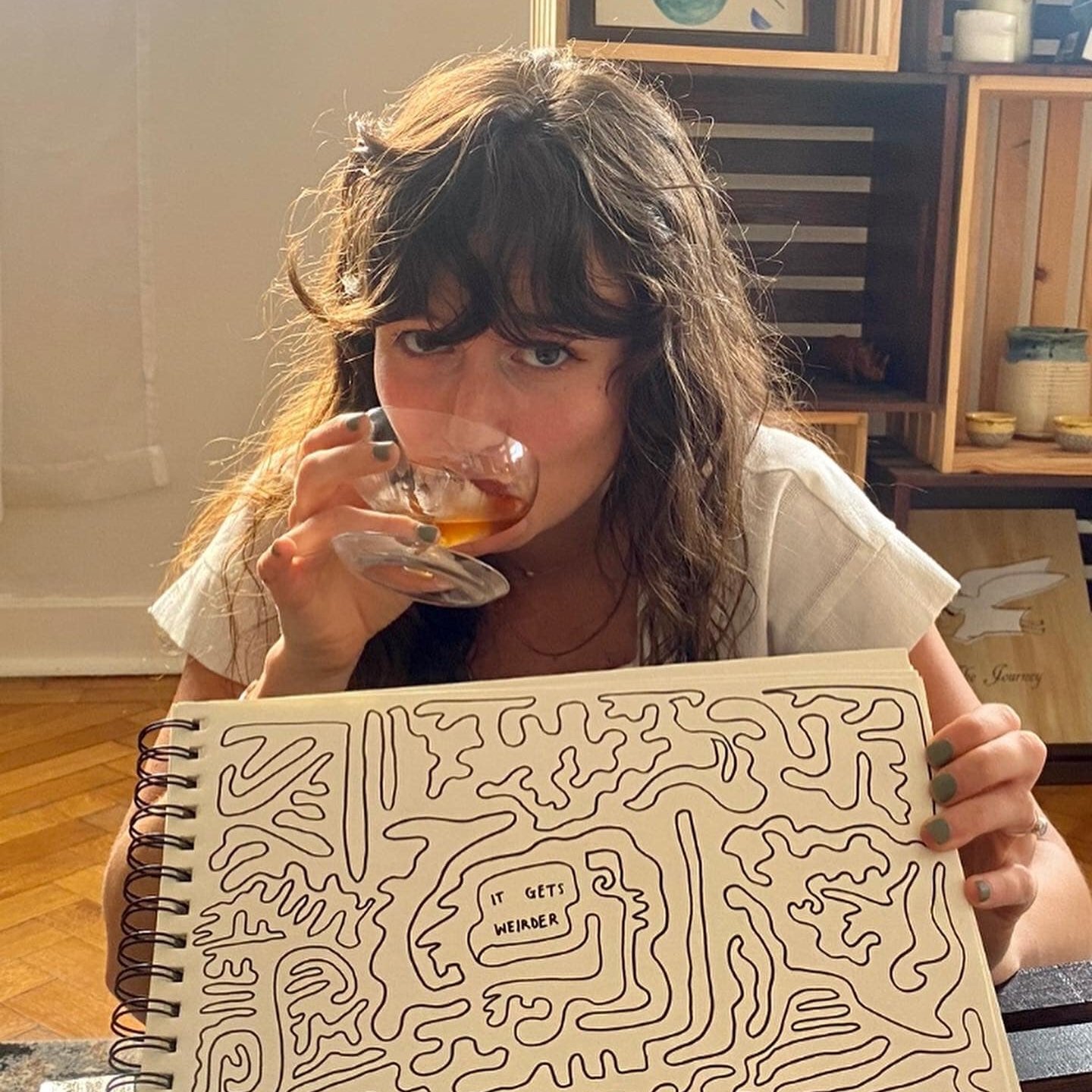Brooke is 26, with a degree in Social Work and a passion for visual art. Her mental health journey began during childhood, and she has experienced periods of depression since then. Brooke’s upbringing steered her away from dealing with the issue. While growing up, Brooke faced her physical maladies head-on, while mental problems and related concerns were complex and challenging to resolve. She was unaware of her emotional state of well-being until she was 21.
As Brooke looks back at her childhood, she realizes she was affected by depression. However, she didn’t display what she thought were the “classic symptoms” of depression: she didn’t sleep all day or display other characteristics associated with depression. She recalls periods of her childhood when she was severely depressed. In looking back at her childhood, Brooke now realizes her romanticized memories are actually filled with episodes of depression.
As she became aware of her struggle with depression, she began to understand her physical symptoms were her body’s way of alerting her when something was troubling. In her early twenties, Brooke suffered severe IBS attacks. She tried to keep the symptoms hidden, which led to recurring hospitalizations. She realized the episodes were related to her state of mind, and she began to understand her body’s way of signaling her.
As she made the connection between her depression and her physical IBS attacks, Brooke realized she needed counseling. Brooke’s upbringing had taught her to go it alone; her family was unfamiliar with mental health-related issues, and they didn’t know where to turn for advice and possible treatment. As a result, she developed unhealthy ways of dealing with her depression, which required considerable effort to “unlearn.” She learned to express her emotions and cope with her depression through her art. She turned to letter writing, poetry, painting, and drawing. This form of expression was her main outlet, so she pursued it passionately. While working one day, she experienced a panic attack. She realized something was wrong: she was completely off balance and couldn’t move. It took several hours to recover. Brooke says, “I felt like my body was in one place, but my consciousness was in another.” She says the years of compounding stress “finally brought me to the breaking point.” Her social work training began to take hold, and she elected to seek counseling to help deal with her depression.
Brooke was initially reluctant to start therapy; it took a long time to admit she needed it. Looking back now, she stands firm in her decision to seek help. “If you can do something to actively better the person you are and your relationship with yourself, why not?”
For a long time, she justified not going to therapy. She told herself countless reasons why she should not go to therapy, or why she did not deserve to help herself. She says, “The healing process one goes through is often very painful, prolonged, and uncomfortable.” Brooke admitted that for a long time, she feared healing.
Brooke is clinically diagnosed with bipolar depression. Her symptoms include manic mood swings from euphoria to depression. She discovered her artistic creativity was at its best during the highs; she felt energetic with unlimited creative potential. During her lows, she found meaning in things otherwise overlooked, and this also translated well into her art. Brooke was prescribed medication, which she refused. Brooke was skeptical about the long-term effects caused by taking anti-depressants and was concerned about entering into a lifelong course of medication. Instead, Brooke sought a course of treatment relying on her own physical intervention, including diet and exercise programs.
When Brooke was in her last depressive period, she realized she needed to make a career change. She says, “I had to start aligning myself more with who I wanted to be, what I believed in, and what gave me energy and life, which is the art and act of creation.” This realization led Brooke to leave social work and pursue art creation as a full-time career path.
Art has given Brooke a sense of purpose: the process of creating something makes her feel connected to others and to the world itself. Brooke says, “I don’t know what I’m here for, but at the moment, I’m making something, and it means something to me, and that’s all that matters. And that makes me feel more settled in a crisis of meaning.”
Art has been a major part of Brooke’s journey to overcome her depression. She derives a feeling of stability and purpose when creating her artwork. She has come to realize a sense of creative power when working with her art; this helps her maintain her sense of awareness when she feels unstable.
Brooke also promotes stability in her life through exercise while not putting too much pressure on herself to perform. She does not see it as an attempt to check off an achievement box but instead recognizes her body needs movement. Exercising helps Brooke connect to her body, making her more aware of herself and allowing her to quickly identify when she’s neglecting her mental well-being.
Eating balanced meals is also vital for Brooke’s stability in her life; it helps nourish her body and brain. Brooke finds it challenging to stick to this; when she’s depressed, she tends to lose her appetite, causing her to undereat. “Getting enough sleep is important to our health and how we feel about ourselves,” Brooke adds. She admits that it’s not always easy to eat a balanced diet, exercise well, and sleep enough. “To get those 3 in a row is a difficult task, especially when you are experiencing different moods because your body responds accordingly.
One key element she focuses on is “finding pleasure in life.” Brooke notes, “It is so important, and people don’t talk about it enough. We are supposed to be enjoying our existence, and people easily lose sight because we are so distracted, and told so many different things about how we’re supposed to be, instead of just being.” Brooke has discovered, “creating something new can bring renewed joy and pleasure – a return to your childhood.” This simple act helps her find peace and joy in times when life tries to bring her down.
Do you or someone you love have a Brain Story to share? We’d love to feature you! Head over to our Brain Story page to learn how to submit your Brain Story. To learn more about our mission to find a cure for brain and mental health-related disorders worldwide, please visit our website at The United Brain Association. If you’d like to receive updates, news, scheduled events, or more information about our ongoing donor-funded research projects, sign up for our email newsletter by clicking here. Together we can find a cure for brain disorders.
You Are Not Alone
For you or a loved one to be diagnosed with a brain or mental health-related illness or disorder is overwhelming, and leads to a quest for support and answers to important questions. UBA has built a safe, caring and compassionate community for you to share your journey, connect with others in similar situations, learn about breakthroughs, and to simply find comfort.

Make a Donation, Make a Difference
We have a close relationship with researchers working on an array of brain and mental health-related issues and disorders. We keep abreast with cutting-edge research projects and fund those with the greatest insight and promise. Please donate generously today; help make a difference for your loved ones, now and in their future.
The United Brain Association – No Mind Left Behind






